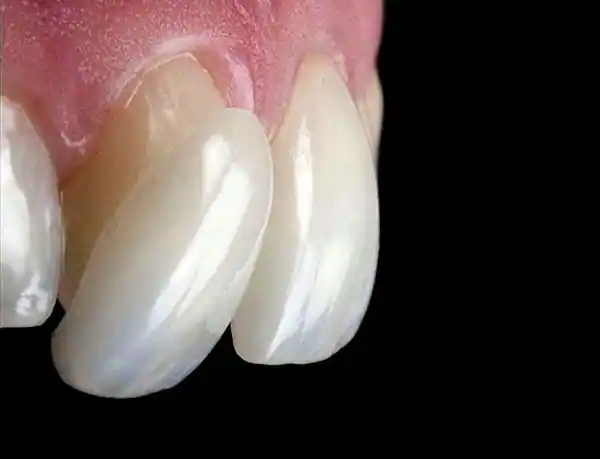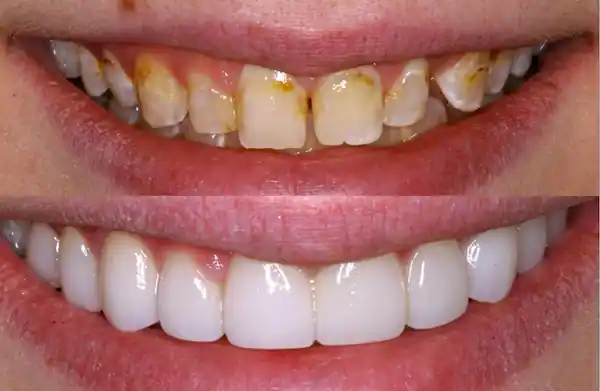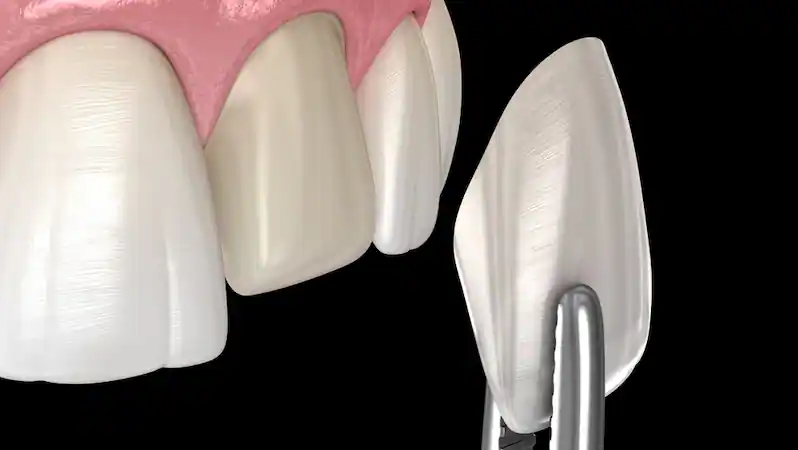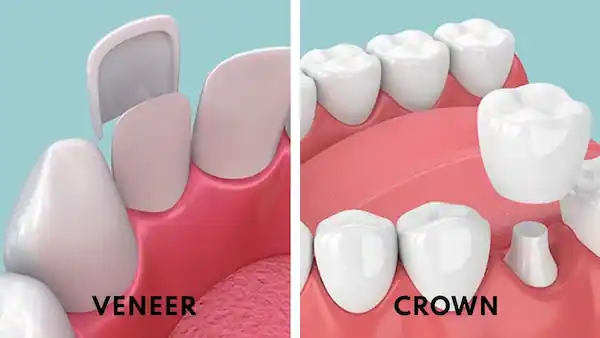What are dental veneers?
Dental veneers are personalized coverings designed to fit precisely onto the outer surfaces of your teeth. They effectively hide aesthetic flaws such as cracks, chips, stains, and other imperfections. Veneers rank among the most frequently sought-after procedures in cosmetic dentistry. Various types of veneers are accessible, tailored to suit your individual objectives.
Dental veneers serve primarily as a cosmetic solution, capable of effectively concealing a diverse array of aesthetic flaws. These imperfections may encompass chips, cracks, gaps, tooth discoloration, and various other concerns.
How do veneers work?
Veneers operate by covering the frontal surfaces of your teeth, effectively improving the aesthetics of your smile. They work to conceal and camouflage cosmetic flaws.
Who can benefit from dental veneers? Anyone seeking to enhance the appearance of their smile can consider veneers. These dental restorations are particularly effective in camouflaging the following:
- Chipped or fractured teeth.
- Diastema (gaps or spaces in the smile).
- Stains that do not respond to teeth whitening.
- Teeth that are disproportionately small.
- Misshapen teeth.
It is important to note that veneers are a suitable option only for individuals without severe cavities or gum disease. If you have significant oral health issues, it is advisable to address those concerns before pursuing cosmetic treatments.
Veneers vs. Crowns: How are they different?
Porcelain veneers exclusively cover the front surface of a tooth, aiming to enhance its visual appeal. On the contrary, dental crowns encapsulate the entire structure of the tooth, providing strength and protection.
Dental veneers primarily serve as a cosmetic treatment, focusing on improving the aesthetics of your smile without necessarily reinforcing or repairing the teeth. While dental crowns can also enhance the appearance of teeth, their main purpose is to restore severely damaged teeth due to decay or trauma.
Are there different types of veneers available?
Certainly! There are several types of veneers to choose from, including composite veneers, porcelain veneers, no-prep veneers, and removable veneers.
Composite veneers
Composite veneers effectively conceal minor cosmetic flaws. These veneers are crafted using a tooth-colored composite resin, which is the same material used for dental bonding. This allows your dentist to achieve the desired aesthetic outcome.
Porcelain veneers
Porcelain veneers are capable of addressing various aesthetic imperfections. These custom-made restorations are designed to fit your dental anatomy. Prior to placement, a small amount of enamel is typically removed from your natural teeth. This step helps create a rough surface, facilitating the secure attachment of the new veneers.

No-prep veneers
No-prep veneers, also known as minimal-prep veneers, offer a less invasive alternative. Similar to traditional porcelain veneers, no-prep veneers are customized to suit your smile. However, they require minimal removal of enamel compared to conventional veneers.
It’s important to note that even with no-prep veneers, some enamel removal is still necessary. Not everyone is a suitable candidate for no-prep veneers, so it’s recommended to consult with your dentist to determine if they are right for you.
Removable veneers
Removable veneers, also called pop-on veneers or snap-on veneers, are designed to cover your natural teeth and mask imperfections. Similar to retainers, you have the flexibility to remove these veneers as needed. While removable veneers can enhance your smile, they may pose challenges when eating and could potentially affect your speech.
Since removable veneers are relatively new, there is limited research available. It’s advisable to consult with your dentist to determine the safety and suitability of this option for you.
What happens before the placement of dental veneers?
During your initial dental appointment, your dentist will conduct a thorough examination of your teeth and gums to determine your eligibility for veneers. If you are deemed a suitable candidate, the preparation process will commence by removing small amounts of enamel from your teeth. Impressions of your teeth will then be taken, which will serve as a basis for creating your custom veneers. It is important to note that dental impressions may not be necessary if you opt for composite veneers.
The fabrication of your veneers by a dental lab typically takes a few weeks. In the meantime, if required, temporary veneers can be placed by your dentist. Once your veneers are ready, they will be shipped to your dentist’s office from the dental lab.
What happens place during the veneer placement procedure?
During your second visit to the dental office, your dentist will carefully examine the shape, color, and fit of your veneers. Subsequently, the veneers will be permanently bonded in place using dental cement. Your dentist will then assess your bite and make any necessary adjustments to ensure proper alignment and comfort.
If you have specific preferences regarding the shape or color of your veneers, it is essential to communicate this to your dentist. They will collaborate with you and the dental laboratory to achieve satisfactory results.
There is typically no downtime following veneer placement. Individuals who receive dental veneers can resume their normal activities on the same day. You can also eat and drink without restrictions once the effects of anesthesia have subsided.
Do dental veneers necessitate special care?
Maintaining the longevity and condition of your veneers requires a few key practices. It is crucial to brush and floss regularly and make regular visits to your dentist. Here are some specific care recommendations:
- Use a soft-bristled toothbrush and non-abrasive fluoride toothpaste to clean your veneers gently. Avoid using whitening products that may potentially scratch the veneer surface.
- Exercise caution when consuming hard or crunchy foods such as apples, carrots, and tough meats. Instead of biting directly into these foods, it is advisable to cut them into smaller, more manageable pieces and chew them using your back teeth.
- While porcelain veneers are generally resistant to stains, it is still wise to avoid consuming dark-colored foods and beverages, including berries, red wine, coffee, and tea. Over time, these items can potentially cause staining on the veneer surface.
What are the benefits of dental veneers?
Dental veneers offer numerous advantages, including:
- Dramatic smile enhancement: Veneers can significantly improve the appearance of your smile, transforming the shape, size, and color of your teeth.
- Natural-looking results: Veneers are designed to blend seamlessly with your natural teeth, providing a natural and lifelike aesthetic.
- Stain resistance: Veneers are more resistant to staining compared to natural tooth enamel, allowing you to enjoy a brighter and more vibrant smile for a longer period.
- Minimal maintenance required: Veneers do not require any special maintenance beyond regular brushing, flossing, and dental check-ups, making them convenient to care for.
- Long lifespan: With proper care, veneers can last between 10 to 15 years, providing long-term improvements to your smile.

What are the drawbacks of veneers?
While dental veneers offer numerous benefits, they do come with certain disadvantages to consider:
- Enamel reduction: In order to accommodate the veneers, a small amount of natural enamel needs to be removed, which is an irreversible process.
- Sensitivity: Some individuals may experience increased tooth sensitivity to hot or cold temperatures following veneer placement, although this sensitivity is typically temporary.
- Risk of damage or dislodgment: While veneers are designed to be durable, there is a slight risk of a veneer falling off or becoming dislodged, which may require repair or replacement.
- Cosmetic coverage only: Veneers are primarily a cosmetic treatment, and as such, they are not typically covered by most dental insurance plans.
Do veneers have any negative impact on your teeth?
No, veneers themselves do not cause damage to your teeth. However, it’s important to note that the natural tooth structure underneath the veneers can still be susceptible to decay or other dental issues. Therefore, maintaining good oral hygiene practices, including regular brushing, flossing, and dental check-ups, is crucial to ensure the health of your natural teeth.
Are veneers a permanent solution?
Most types of dental veneers are considered a permanent solution because they involve the removal of a small amount of enamel from the natural teeth. This process is irreversible. However, certain types of veneers, such as no-prep or minimal prep veneers, offer a reversible option where minimal to no enamel removal is required.
On average, with proper care and maintenance, dental veneers can last between 10 to 15 years. Over time, they may require replacement or repairs to maintain their optimal appearance and functionality. Regular dental visits can help monitor the condition of your veneers and address any concerns.
Maintaining the beauty of your veneers: tips for care and maintenance
To maintain the good condition of your veneers, consider the following tips:
- Brush your teeth at least twice a day: Use a nonabrasive fluoride toothpaste and a soft-bristled toothbrush to gently clean your veneers and natural teeth. Pay attention to brushing along the gumline and all tooth surfaces.
- Floss daily: Floss between your teeth to remove any plaque or debris that may accumulate. Proper flossing helps keep the area around your veneers clean and healthy.
- Use an antibacterial mouthwash: Rinse with an antibacterial mouthwash twice a day to help reduce bacteria and maintain a fresh breath. Choose a mouthwash that is compatible with your veneers and does not contain any abrasive ingredients.
- Avoid using your teeth as tools: Refrain from using your veneers or natural teeth for tasks such as opening packages or tearing off clothing tags. Using your teeth inappropriately can potentially damage the veneers or cause them to become dislodged.
- Schedule regular dental exams and cleanings: Visit your dentist as recommended for routine check-ups and professional cleanings. Your dentist will assess the condition of your veneers, clean them thoroughly, and identify any potential issues early on.
By following these practices and maintaining good oral hygiene, you can help ensure the longevity and optimal appearance of your veneers.





